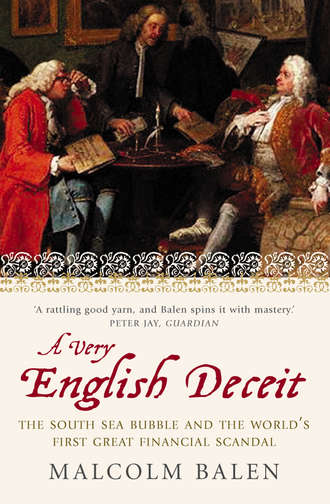
Полная версия
A Very English Deceit: The Secret History of the South Sea Bubble and the First Great Financial Scandal
Before Louis XIV died Law had presented him with plans for a state bank to issue paper money along the lines of the bank he had so nearly established for Victor Amadeus in Turin. He would pay off the national debt by issuing stock, with the shares to be redeemed after twenty-five years, and he promised to cut interest rates from 7 per cent to 5 per cent. Few gamblers, if any, can break a bank; fewer still can create one with wealth gained from the tables. But Law offered to pay for the cost of establishing the bank himself, from his gambling riches, and to give half a million livres to the poor if the project failed. Perhaps with his rejection by the Scottish Parliament in mind, he also declared he would restore French credit to a higher level than that of Great Britain. So hopeful was he of a positive outcome to his proposals that he had even drafted the letters patent authorising the bank’s creation for the King to sign. But Louis had turned him down.
On Louis’s death, power passed to the Duke of Orleans, who, as Regent, held the throne on behalf of the child-king, Louis XV. The Duke was more amenable to Law’s project than the late King had been, and perhaps more realistic too about the condition of the country and the stark choices it now faced. His finance minister opined that ‘we have found matters in a more terrible state than can be described; both the King and his subjects ruined, nothing paid for several years past and confidence entirely gone’. Desperate times needed desperate measures. On 1 May 1716, Law was finally offered the chance he had been seeking for most of his adult life. A decade after his rejection in Edinburgh, he was given the opportunity to put his ideas into practice. Now in his forties, he was no longer a young gambler, but well on the way to statesmanship.
The Banque Générale was based in Law’s own home, a sign both that it was his fiefdom and of its modest beginnings. It had a narrow capital base of only just over 4 million livres, or £300,000, and less than a tenth of this was held in cash, but it was a start. Law finally issued his much vaunted paper money, on the understanding that at any time it could be exchanged for ‘coin of the weight and denomination of that day’. It was the first time in France’s history that banknotes had been in circulation, and it was one of only six states in the world that had paper money, joining the club of which Sweden, Genoa, Venice, Holland and Great Britain were members. It was the first time, however, that paper money was being used in a systematic and disciplined way – not just as a means of representing money, but as money itself. Law wanted to move to an economy where coins were no longer in circulation, to a metalless financial system where banknotes were the only form of currency. His System – and it was always given a capital S – was potentially harsh. The penalty for forging or altering the paper currency that bore John Law’s signature was death. By this signal Law, and implicitly the Regent, declared that the project would work only if the rules were stringently obeyed. Break the link between the paper currency and the financial integrity and solidity of the bank which it represented, and the System was corrupted, and doomed to failure. Fail to honour the banknotes by being unable to pay in metal, should anyone demand it, and the paper was fit only for the bonfire.
The newspapers condemned Law as a charlatan, but gradually he won over the public’s confidence. Two factors helped him: his sharpness of purpose, which meant he could accurately anticipate what would appeal to his customers, and, crucially, the Regent’s support. By offering to pay bills through his bank, free of charge and in any part of the country, Law showed his customers that his System could work, and that his experiment could apply to the whole country and not just to Paris. The Regent’s support was public and to the point: in broad daylight he deposited a pile of coins at the bank worth a million livres.
At first, the public was suspicious of the new paper banknotes, but gradually the project began to catch hold, not least because of the financial backing offered at the highest level. The Regent’s confidence bred confidence among his people: the initial scepticism of the French citizens was finally overcome when they saw that the banknotes were the one type of currency that could not be randomly diminished by clipping or devaluation. Law’s bank soon reduced its discount rate and began to lend money to businesses. Trade picked up; industry gathered pace; and so did Law’s career. At Law’s request, the Regent ruled that his tax collectors in the provinces were to send their money to Paris in the form of the bank’s notes, and to accept the notes for any coins they had in their own treasuries. At a stroke, the Regent helped Law see off the vested interests of the revenue collectors, who had formed a joint-stock company which became known as the Anti-System, to oppose him. Soon, taxpayers were forced to pay their dues in paper. Thus the currency spread throughout the nation.
But Law wanted more. He knew that a bank did not have to be the passive recipient of other people’s money. It could be instead a driving force of the economy, a motor which could create wealth by granting credit. Gold and silver, fool’s gold and silver, would no longer be needed. The ultimate prize was worth the inevitable political and economic battles that lay ahead. His project could end the depression and deflation which had so addled Europe in the new century.
England could only look on with alarm.
When Queen Anne died, so did the Tory party as an immediate fighting force. As the remnants of Harley’s supporters made their way to the opposition benches, or even, in Henry St John, Viscount Bolingbroke’s case, into Jacobite exile, so too there was a changing of the guard amongst His Majesty’s representatives and diplomats abroad. Matthew Prior, the peace negotiator, had stayed on in Paris after successfully completing the negotiations which led to the peace deal of the Treaty of Utrecht, the diplomatic ‘triumph’ built on military ignominy, which had provided the dishonourable foundations of the South Sea Company’s rise to prominence. But on George I’s accession, Prior was dispatched to spend more time on his poetry, and in his place came John Dalrymple, the Earl of Stair. With Law in Paris too, in the city there were now two Edinburgh men of similar mien: perhaps, to Law’s eventual discomfort, too similar.
Stair, like Law, was a mixture of the cavalier and the puritan. It was said that he had forced his wife to marry him by hiding in her bedroom, so that only a wedding ceremony could save her reputation. But he was, as if in contrast, a stern defender of his country’s honour and almost from the start he took a watching brief over Law’s activities. Stair was the first person Law had sought out on his arrival in Paris, pressing him to intercede with the government in London: brimming with ideas and with the accumulated wealth of a thousand gaming tables, Law had informed the Earl that he still wished to serve his own country, that he wanted to put his talents at the disposal of the King, but not for personal gain. Stair had agreed to help, writing to the Secretary of State, James Stanhope, who was the most powerful figure in Sunderland’s government: ‘there is a countryman of mine named Law of whom you have no doubt often heard. He is a man of very good sense, and who has a head fit for calculations of all kinds beyond anybody. Could not such a man be useful in devising some plan for paying off the national debts? He is a man of very solid good sense, and in the matters he takes himself up with, certainly the cleverest man that is.’
Конец ознакомительного фрагмента.
Текст предоставлен ООО «ЛитРес».
Прочитайте эту книгу целиком, купив полную легальную версию на ЛитРес.
Безопасно оплатить книгу можно банковской картой Visa, MasterCard, Maestro, со счета мобильного телефона, с платежного терминала, в салоне МТС или Связной, через PayPal, WebMoney, Яндекс.Деньги, QIWI Кошелек, бонусными картами или другим удобным Вам способом.



